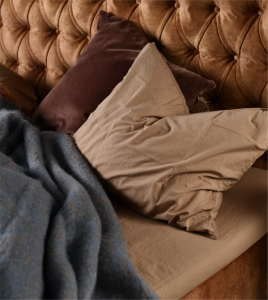FREQUENTLY ASKED QUESTIONS – DUVETS AND PILLOWS
Every day we face various consumer decisions. Some of them, however, are more complex than others, such as buying exactly the right duvet and pillow.
Here are some tips to ensure better and sweeter sleep.
Find the perfect duvet and pillows
Every day we face various consumer decisions. Some of them, however, are more complex than others, such as buying exactly the right duvet and pillow.
One of the first things to pay attention to when buying a duvet or pillow is the choice of filling –natural or synthetic. This largely depends on the sleeper’s personal preferences and what they find most comfortable, but it’s also worth considering factors such as allergies, washability, breathability, and durability.
Read more about The Fine Bedding materials here
What to Do If I Have Allergies
According to information from the UK Allergy Association, allergies occur when the body’s immune system reacts excessively to a normally harmless substance such as pollen, food, or dust mites. The body perceives this substance as a threat and overreacts.
Recent studies indicate a rising trend in the prevalence of allergies, affecting up to 40% of the world’s population at some point in life.
As over a third of life is spent in bed, to prevent staying up at night due to allergies, we have put down some tips to combat dust mites:
• Choose a high-quality duvet and pillow that can be regularly washed at 60 degrees to kill dust mites. Our Spundown product series is an ideal choice as it can be easily washed at home without damaging the product’s properties.
• Synthetic duvets and pillows are almost inevitable in case of allergy problems. Duvets filled with silk and wool are also allergy-safe alternatives to feather products.
• Those suffering from allergies can use allergy-free bedding designed to reduce allergy symptoms and provide better sleep.
• Machine-washable pillows should be washed every three months to deal with dust mites.
How to achieve the best sleep hygiene
Sleeping well should be easy, but if you’ve had trouble falling asleep or waking up at night, poor sleep hygiene may be the cause. Achieving good sleep hygiene is simple and requires following some simple steps for quality sleep every night. This, in turn, sets the stage for a more productive day. Both children and adults can benefit from good sleep hygiene. So, if your sleep is disturbed, falling asleep is difficult, or you often feel tired during the day, it may be time to make some changes to your sleep hygiene using the following tips:
1. Establish a sleep routine
Going to bed at the same time every night and waking up at the same time every morning can help your body get used to falling asleep and not waking up unnecessarily at night. It’s also helpful to determine your sleep needs (considering that everyone’s needs are different) and making sure it gets met every night.
2. Physical activity
An active lifestyle not only promotes good physical health but also contributes to a good night’s sleep. Just make sure that physical activity falls temporally more in the morning or afternoon rather than in the evening, as evening exercise can have an invigorating rather than a calming effect on the body. Find a suitable time for physical activity.
3. Enjoy daylight
Parents often send their children outside to play in the sunlight, and it wouldn’t hurt adults either. Being in natural light contributes to a healthy sleep-wake cycle.
4. Establish a bedtime routine
Another tip that applies not only to children – a regular calming and relaxing routine before bedtime can improve sleep hygiene and make falling asleep and staying asleep easier. You can try a warm bath or quiet music – the goal is to leave daily worries behind.
5. Think about the sleeping environment
Attention should be paid to the bedroom – is it dark and quiet enough, and at a suitable temperature for sleep? Would it help to get a new mattress, comfortable pillows, or change the bedding? Basically, the bedroom should be an inviting sleep space where the sleeper feels relaxed, comfortable, and safe. Avoid watching TV and using electronic devices in bed.




